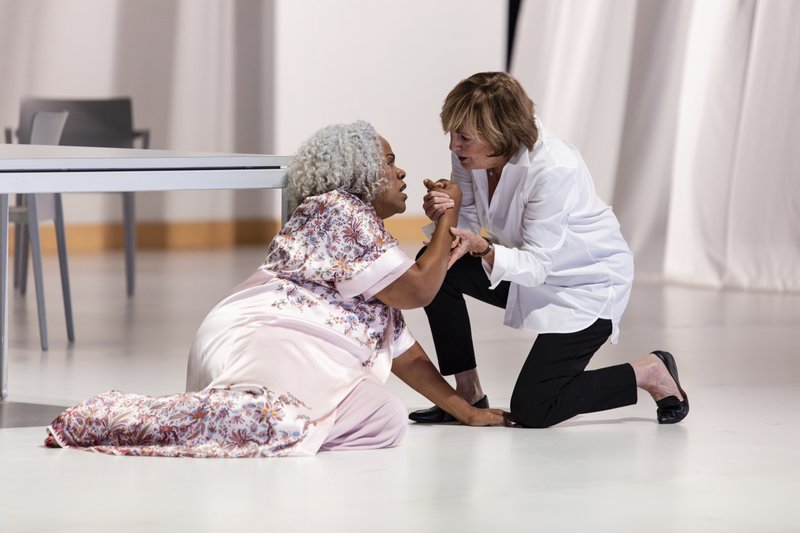
Sky on Swings by Lembit Beecher in its world premiere. Opera Philadelphia as part of its O18 Festival, September 2018.
At last we have an opera about Alzheimer’s, the irreversible, progressive brain disorder that afflicts thirty million people worldwide and devastates their family and friends. This plague traumatizes so many people that it deserves to be explored, and Opera Philadelphia presented the world premiere of Sky on Swings to inaugurate its O18 Festival.
Composer Lembit Beecher and librettist Hannah Moscovitch collaborated to create a compelling vision of two women with Alzheimer’s, showing the disease at different stages.
Their I Have No Stories to Tell You at last year’s O17 festival was promising; now they’ve taken a giant leap forward. Beecher’s music, especially, captures the confusion and anger that accompanies the onset of this disease. He is especially impressive in his writing for concerted voices, including a quartet who play medical staff and nursing home residents. Their alternating harmonies and dissonances are haunting. Beecher’s score explores fragmentary strands and shifting colors, which is perfectly appropriate for the subject.
Unlike last year’s opera which used ancient instruments, Beecher here employs an orchestra that includes a string quintet and has prominent passages for harp, vibraphone and — contrastingly — trombone.
Moscovitch’s words eloquently portray the grim facts, and point out that Alzheimer’s eventually destroys the ability to perform the simplest tasks, even the ability to swallow and to breathe. They sugarcoat the final stages with a feel-good finale. Many operas, of course, end with tragedy, but I can understand the choice to avoid such depressiveness when the subject is so close to the lives of audience members. Obviously, no one knows how much emotion is felt by Alzheimer’s patients, and this opera chooses a romanticized view.
We meet Marietta Simpson as Martha, an institutionalized woman in an advanced stage of Alzheimer’s, and her visiting daughter. Martha hallucinates and is obviously frightened. Simpson pulls off the challenge of singing unintelligible sounds, rapid fire, with eloquence. Her mezzo voice, at the age of 59, is warm and resonant. She regains the ability to express herself coherently late in the opera, and sings beautifully.
We also meet Frederica von Stade as Danny, a highly-educated professional woman who has begun to forget things. (It’s unclear why this character is given a man’s name, unless it’s to indicate that Alzheimer’s afflicts both sexes, or to hint at a repressed homosexuality.) Her son, strongly played by baritone Daniel Taylor, administers a diagnostic word-finding test and is appalled when she fails it. Danny reacts with fury to the prospect that her intellect and personality will disappear. Her characterization indicates how Alzheimer’s seems to be most horrifying when it attacks people who are highly intelligent. Von Stade at age 73 still has a pleasurable voice and her acting is touching.
Although the opera focuses on these two people (while its other characters are diminished) it is by no means a “vehicle” that’s dependent on name stars. Their characters are fleshed out, multi-dimensional.
The libretto then does a fast shortcut and Danny is admitted to the same nursing home where Martha resides. Moscovitch missed an opportunity here to explore the confounding choices that have to be made, and the pain of a person confronting the selling of her home and leaving behind the possessions of a lifetime. We also are deprived of seeing the harrowing ordeal of children who feel guilty that they cannot care for their parent.
Martha’s daughter is played by soprano Sharleen Joynt who has shimmering, floating high notes. She explains that she left her husband and is unattached, but this sub-plot is not explored. Some attendees will feel that the roles of the family members are underdeveloped.
Neither of the leading characters has a husband and this cheats the audience. The anger of a spouse when he sees his life’s partner gradually disappear in front of him can be anguishing. This opera, instead, shows one woman as a widow and the other as a divorcee.
Moscovitch’s libretto becomes an exposition of what each of those women might be experiencing internally as their senses disappear. Sky on Swings focuses on their friendship in the home. As other residents wander to and fro, Martha recalls her long-ago infatuation with another woman. Danny responds affectionately. Was this touch of lesbianism necessary? Or is it interjecting a distraction?
Beecher’s colorful music contrasts with a set by Andrew Lieberman that’s starkly white and grey. Joanna Settle directs with simplicity and Geoffrey McDonald conducts the eleven-piece orchestra with clarity and expressiveness.
An earlier version of this review appeared in The Opera Critic.